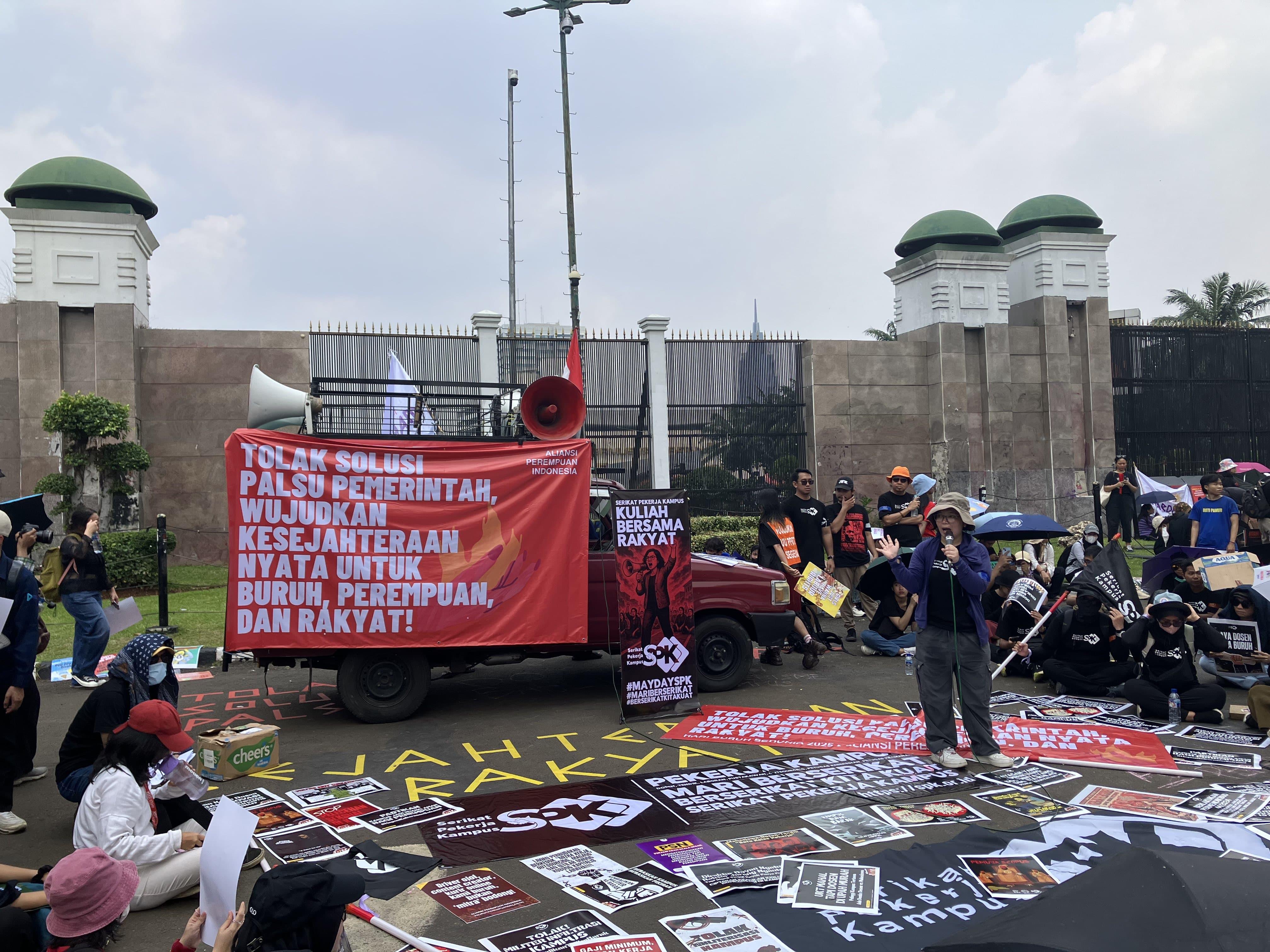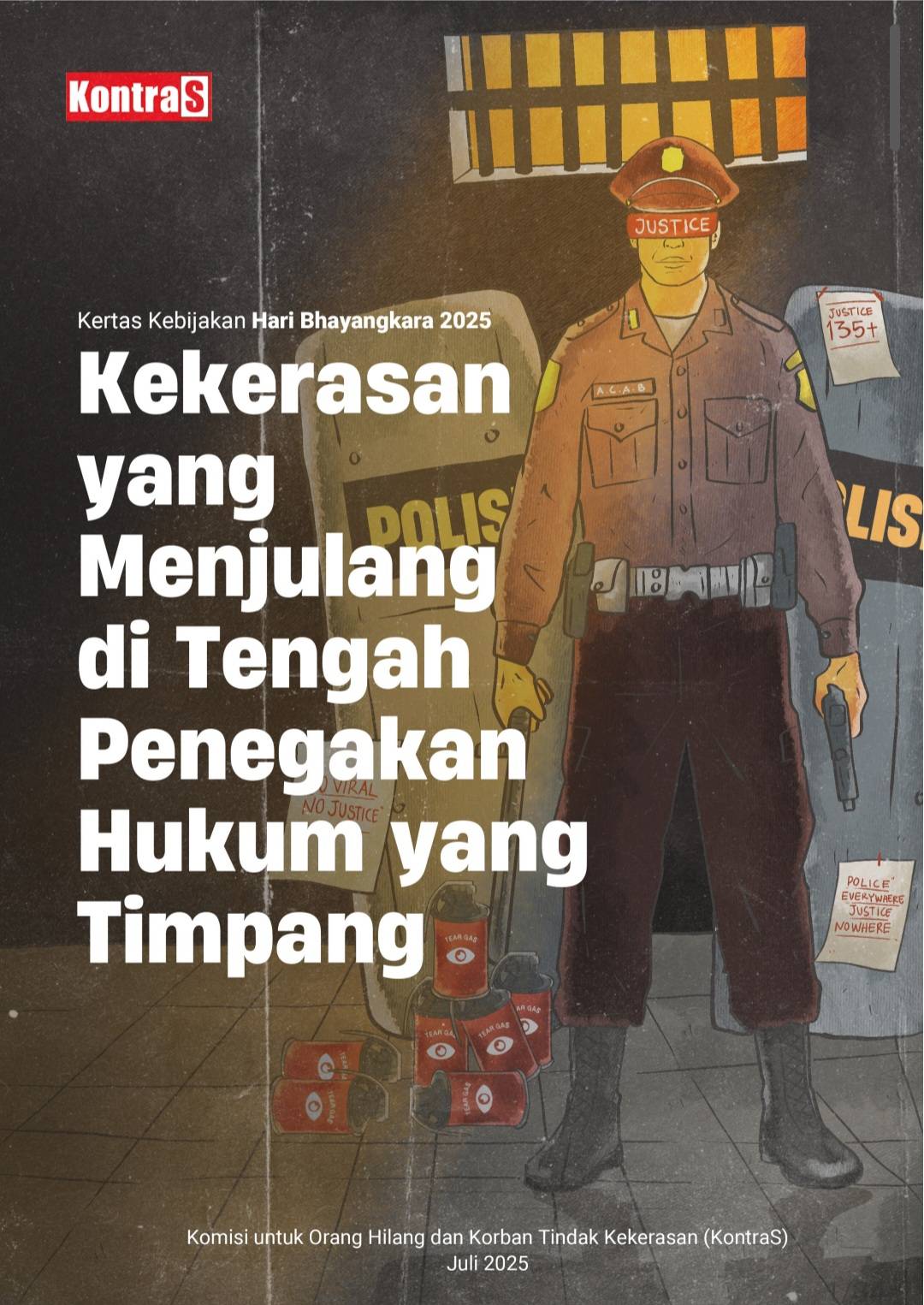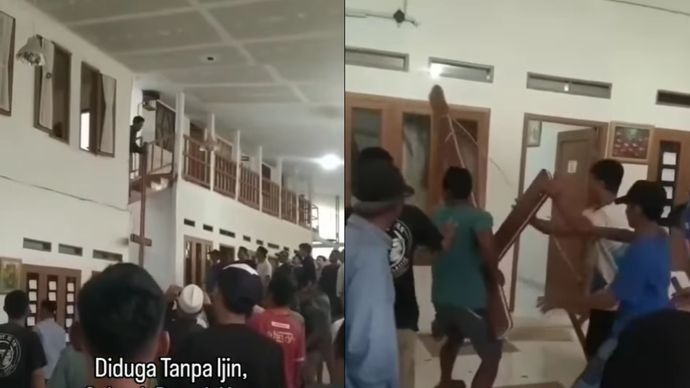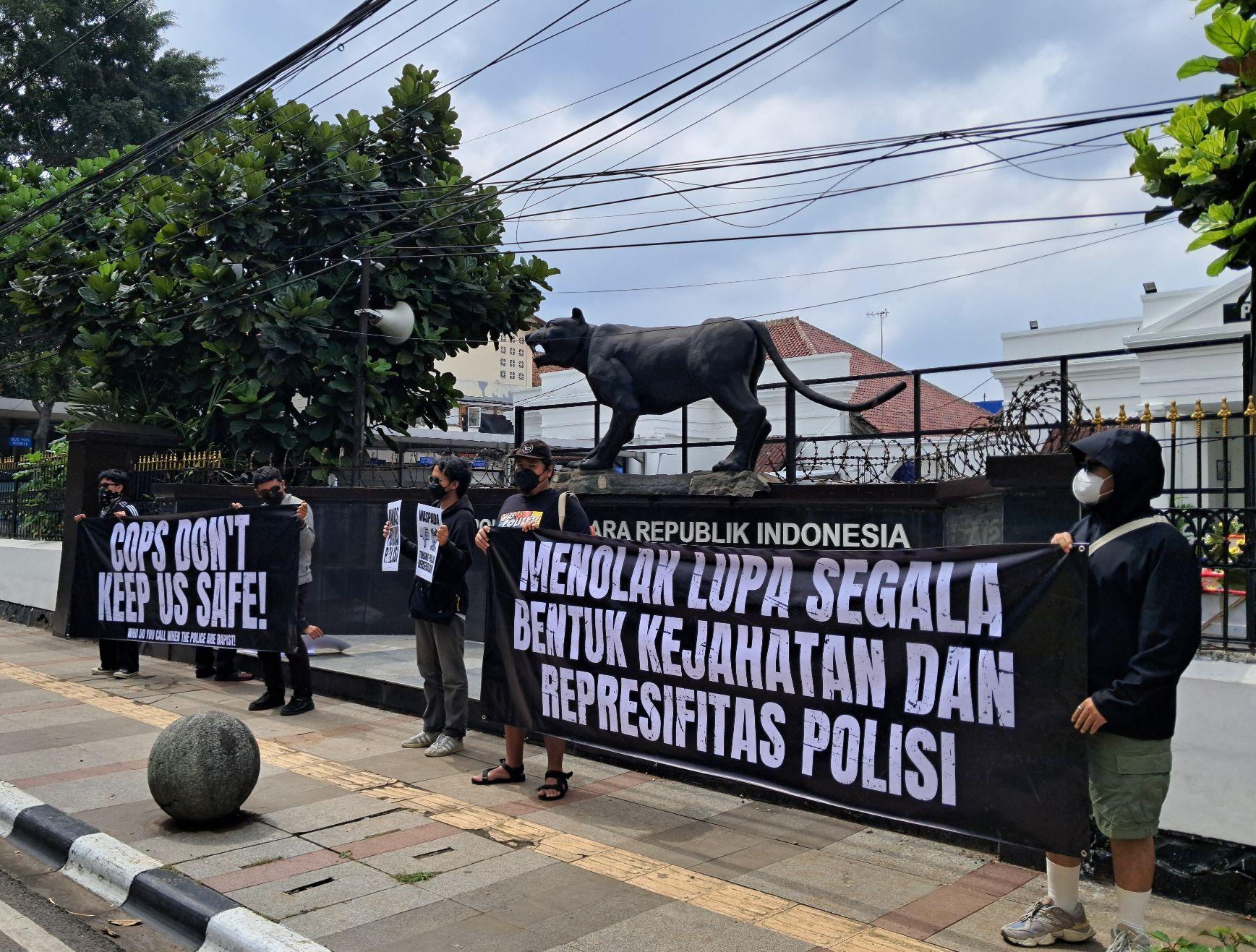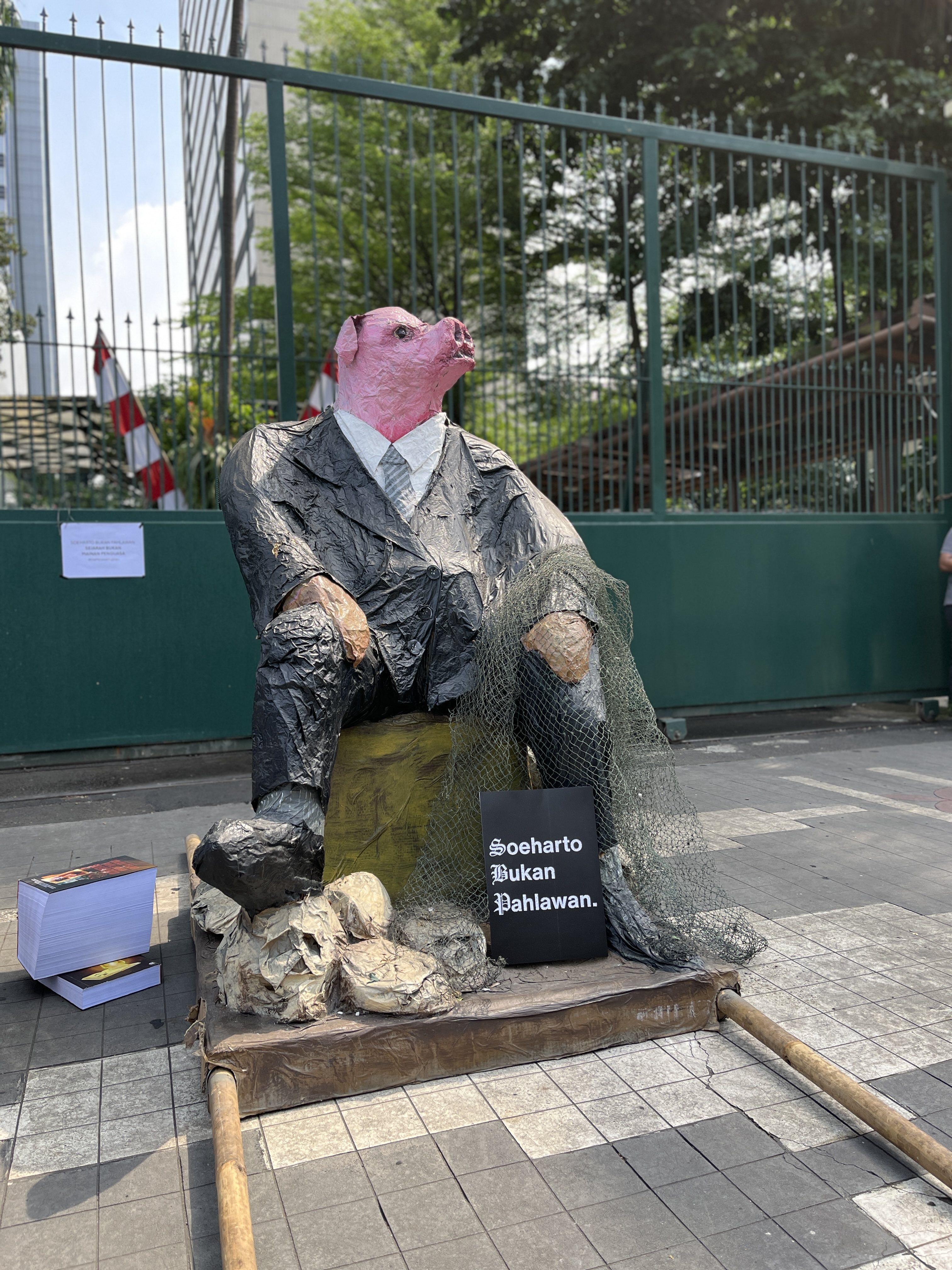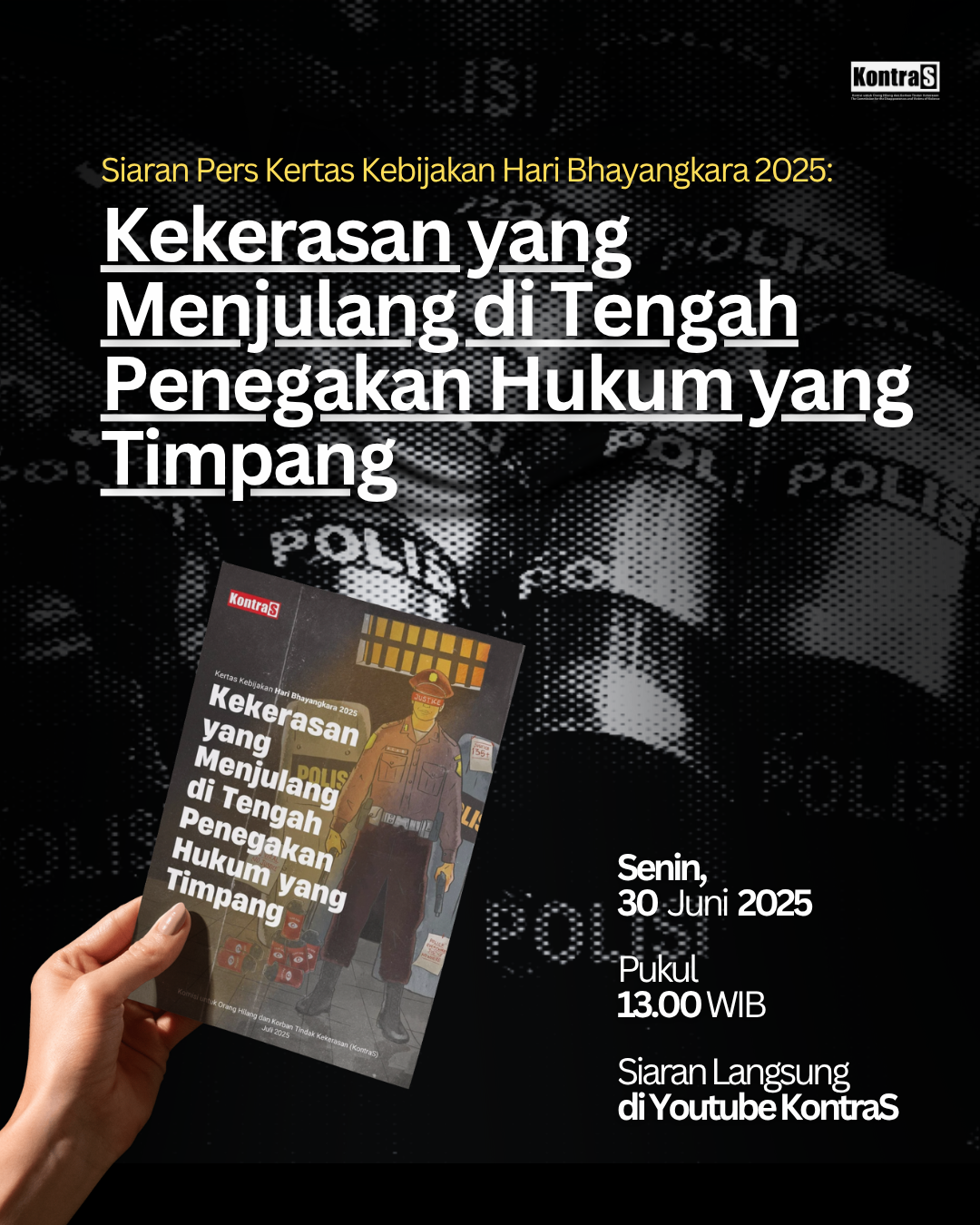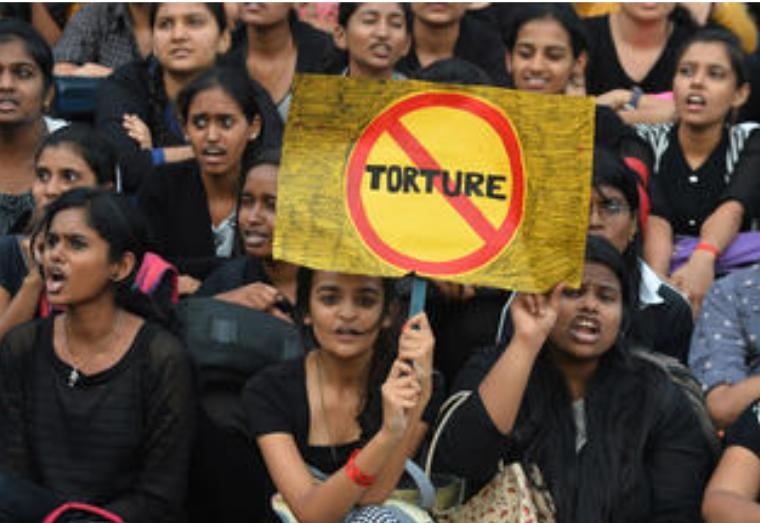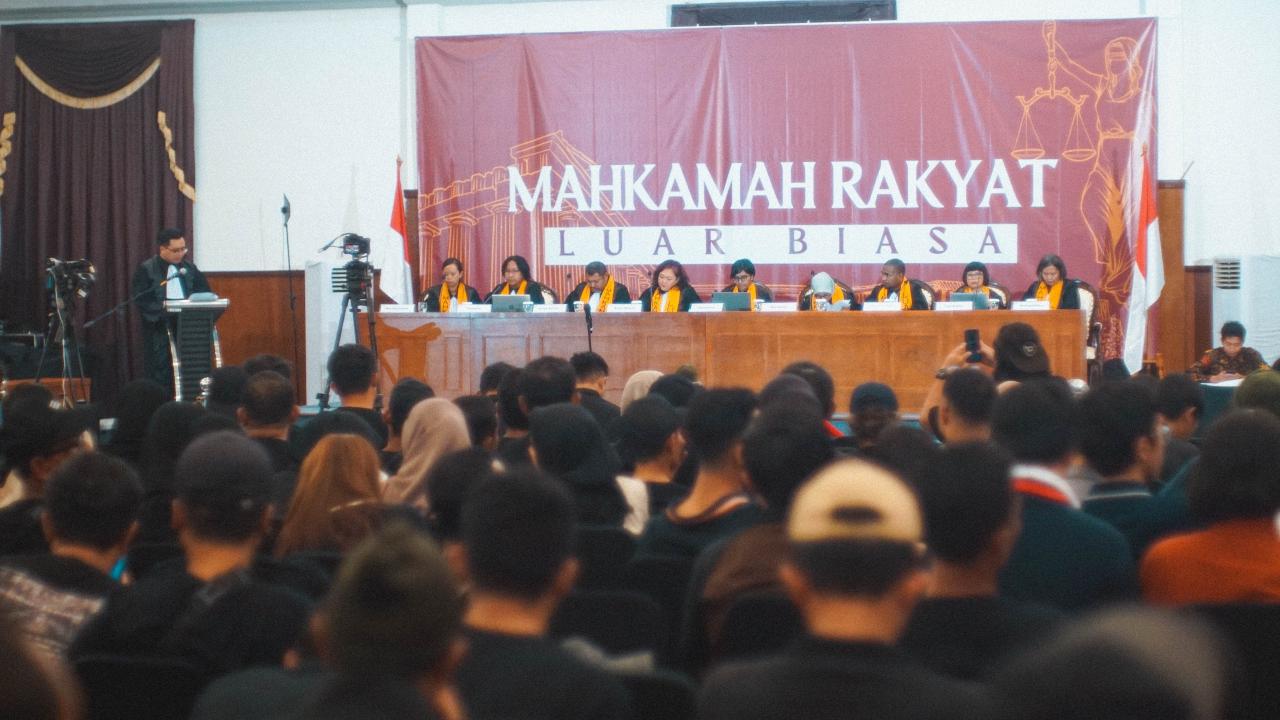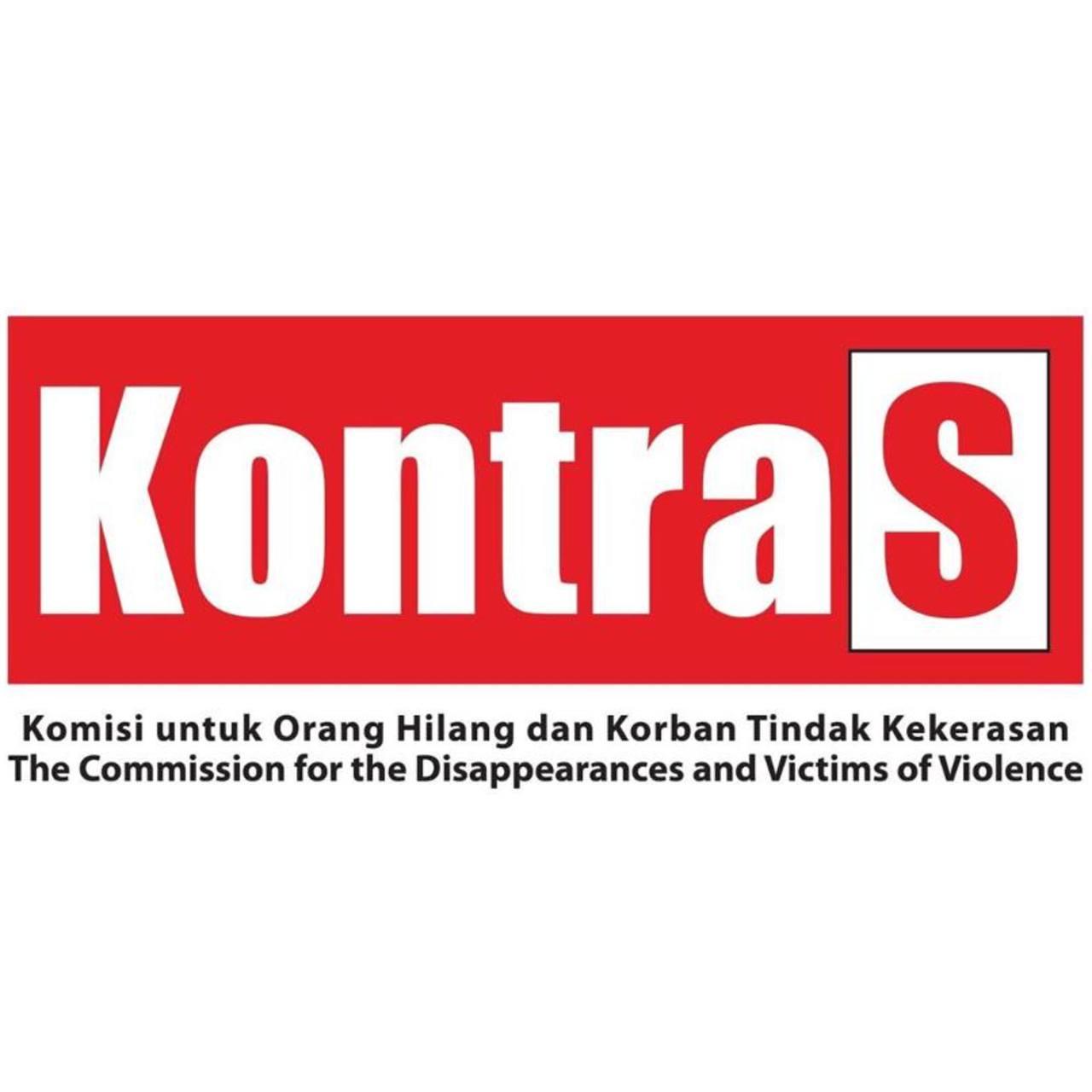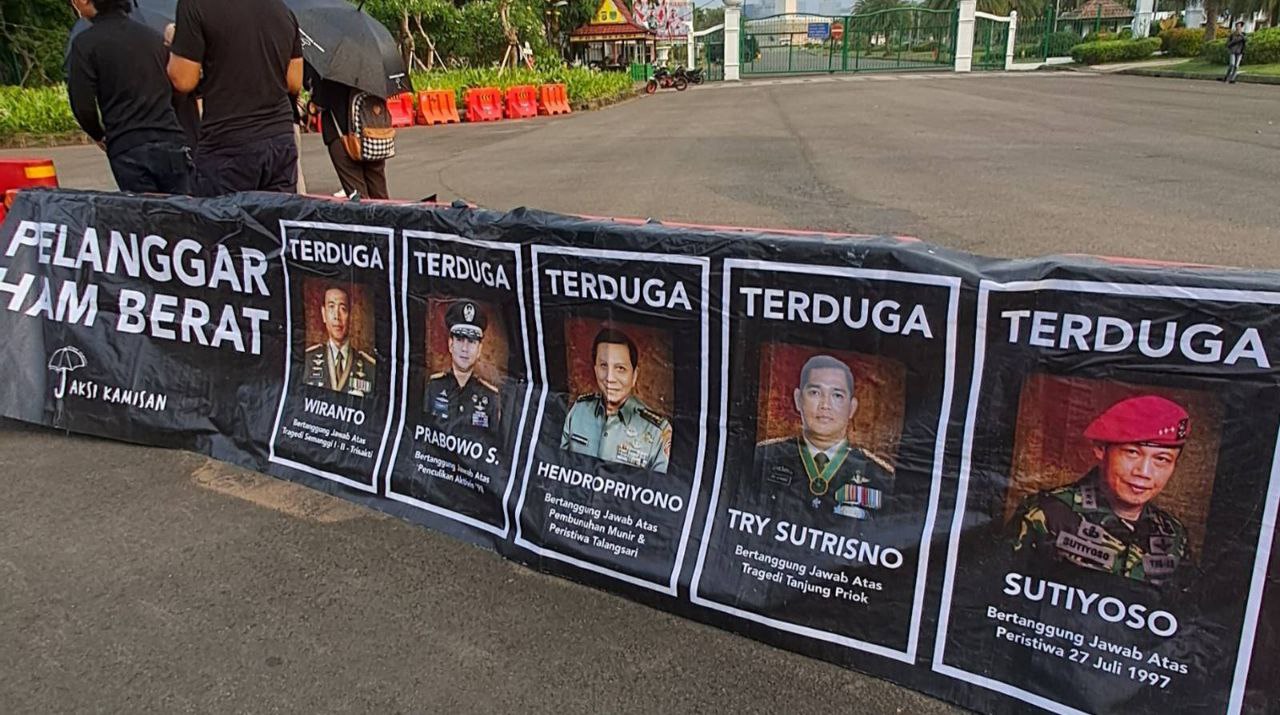Jakarta, 2 May 2025 – Police forces carried out repressive and brutal actions, as well as arbitrary use of force, against demonstrators participating in the 2025 International Workers’ Day celebration in Jakarta. A series of actions by the police constitute criminal conduct, violate statutory provisions, disregard the Professional Code of Ethics, and breach international human rights principles.
The protesters, united under Gebrak (People’s United Labor Movement), held a demonstration in front of the House of Legislative’s (DPR) Building starting at 09:00 AM Jakarta Time as part of the 2025 International Labours’ Day celebration. On this occasion, the demonstrators demanded that the government and Parliament protect workers’ rights, ensure welfare guarantees, and adopt non-discriminatory policies. Based on the monitoring and assistance provided by the Advocacy Team for Democracy (TAUD), we have documented several instances of unlawful actions committed by security forces against the demonstrators.
1. Police Violated the Law and Acted Repressively and Brutally Against Protesters While the Demonstration Was Still Ongoing
-
Police officers blocked and searched protest equipment and the personal belongings of students demonstrating in front of the Parliament Building (DPR) at around 08:20 AM WIB. Some students were even accused of being part of “anarchist groups” without clear evidence. These actions violated Law No. 1 of 1981 on the Indonesian Criminal Procedure Code and represent a serious breach of the right to freedom of expression as stipulated in Law No. 9 of 1998 on the Freedom to Express Opinions in Public.
-
Police officers assaulted paramedics stationed at the medical post. We found that four of the 14 protesters arrested were part of the medical team and were carrying out their duties providing medical assistance. These medical personnel were subjected to assault, including beatings to the head and neck. In several cases, the assault lasted 3–4 minutes, even though the victims had already surrendered and offered no resistance.
-
Police officers brutally attacked the protesters. We identified three protesters who suffered head lacerations as a result of physical violence by the police. Of the 14 protesters arrested, 13 sustained external injuries and bruises across their bodies. Victims reported being punched, choked, shoved, kicked, and even run over by motor vehicles. These incidents clearly constitute violations of Law No. 39 of 1999 on Human Rights pertaining to human rights, the Regulation of the Chief of the Indonesian National Police No. 8 of 2009 on the Implementation of Human Rights Principles and Standards in the Conduct of Duties of the Indonesian National Police, and the Police Professional Code of Ethics.
-
Police officers closed off public facilities by installing barbed wire on the pedestrian overpass (Jembatan Penyeberangan Orang, JPO), which should have served as an access route for the public, including demonstrators seeking to exercise their right to cross the road near the protest site.
-
Police forcibly dispersed the ongoing protest without warning or any legally valid grounds. At approximately 5:00 PM WIB, they also conducted violent arrests to break up the demonstration. The dispersal was carried out while the protest and musical performances were still in progress, using water cannons and tear gas in a manner inconsistent with Law No. 9 of 1998 on the Freedom to Express Opinions in Public.
-
Police used violence against journalists and obstructed journalistic work during coverage of the protest. These actions violated Law No. 40 of 1999 on the Press, which essentially guarantees the press the freedom to seek, obtain, and disseminate ideas and information.
-
Police committed acts of sexual violence, including both physical and non-physical sexual harassment, against a female protester who was arrested. These actions contravene Law No. 12 of 2022 on Sexual Violence Crimes
-
Police officers did not act professionally in carrying out their duties. They failed to adhere to the standards outlined in Law No. 2 of 2022 on the Indonesian National Police and the Indonesian Criminal Procedure Code (KUHAP), such as not wearing official uniforms, even donning attire resembling that of the protesters, and failing to display proper identification when making arrests and using force against the demonstrators.
2. Police Obstruct Access to Legal Assistance for Protesters
-
When the TAUD team contacted POLDA Metro Jaya, we were not immediately provided with access or complete confirmation regarding the names of the arrested protesters. Information about the identities of the detainees was only obtained and clearly confirmed around 9:00 PM WIB.
-
Public lawyers from TAUD were asked to surrender their mobile phones (tools of their work) during legal assistance, without any clear justification.
-
Police officers confiscated mobile phones from the arrested protesters, making it difficult for them to contact their families or lawyers. This action violated Article 14 of the International Covenant on Civil and Political Rights (ICCPR), as ratified by Law No. 12 of 2005, as well as Article 60 of the Indonesian Criminal Procedure Code (KUHAP), which essentially states that every individual is entitled to adequate time and facilities to prepare their defense and communicate with their chosen legal counsel.
3. Legal Violations by Police During the Examination Process of Protesters
Currently, the TAUD team is still providing assistance to 14 protesters who were arrested and are undergoing examinations at Polda Metro Jaya. During the examination, we identified several legal violations committed by the police, including:
-
Police officers conducted urine tests arbitrarily, despite the fact that the ongoing examination was not part of a narcotics crime investigation. The forced urine tests were carried out before legal assistance was provided. The police also requested fingerprinting and access to personal email accounts, which potentially violates personal data protection rights as outlined in the Personal Data Protection Law.
-
The examination of the arrested protesters was conducted through an illegal procedure, specifically with clarification/investigation/interrogation minutes that are not recognized under the Indonesian Criminal Procedure Code (KUHAP). In practice, this became an opportunity to fabricate evidence due to the lack of sufficient initial evidence.
-
The police conducted examinations on individuals with serious injuries, continuing the questioning until 5:00 AM, when the individuals had already suffered excessive fatigue, making them prone to acquiescing to police questions. This can be considered a form of torture as defined under the Convention Against Torture and Other Cruel, Inhuman or Degrading Treatment or Punishment, which has been ratified through Law No. 5 of 1998.
-
Despite the pain suffered by one of the arrested protesters, the police continued the examination even after the individual was advised to rest by the medical doctor from the Polda Metro Jaya Medical and Health Division. This examination was carried out after the victim was seemingly allowed to rest following the doctor’s examination. Shortly after the lawyer left the room to let the protester rest, the police woke the individual and continued the examination without legal assistance, while the individual was still enduring significant pain.
-
The police obstructed the victim of violence from accessing medical care. To gain access to the hospital, the lawyer had to argue with the police about the need for a more comprehensive medical examination to assess the victim’s condition following the police abuse. Due to the delay in taking the victim to the hospital, the condition worsened, and the victim has since required hospitalization.
A series of actions by the police, as outlined above, have clearly threatened civil liberties, particularly the rights to assemble and express opinions in public, and violated various relevant laws, including Law No. 9 of 1998 on Public Expression, Law No. 8 of 1981 on the Indonesian Criminal Procedure Code (KUHAP), Law No. 39 of 1999 on Human Rights, the Narcotics Law, Law No. 27 of 2022 on Personal Data Protection, and the Regulation of the Indonesian National Police No. 8 of 2009 on the Implementation of Human Rights Principles and Standards in Police Duties.
In relation to the above points, we are of the view that:
-
All police actions from the arrest to the examination were unlawful, as they lacked legal basis and were not regulated under the Indonesian Criminal Procedure Code (KUHAP). The examination process conducted on the 14 arrested protesters is legally and administratively flawed, and therefore must be declared null and void.
-
All police actions from the arrest to the examination were actions that demeaned human dignity. These actions constitute human rights violations, including the right to security, the right to legal assistance, the right to equality before the law, the right to be free from torture, the presumption of innocence, and other rights as enshrined in the 1945 Constitution of the Republic of Indonesia and Law No. 39 of 1999 on Human Rights.
-
All police actions, including obstructing journalists, arresting and using violence against medical teams, blocking pedestrian overpasses (JPO), and using water cannons to disperse the protest, represent an attack on the freedom of expression and opinion, which is a fundamental right in a democratic rule-of-law state.
Based on the above, we urge the following:
-
The Head of the Metro Jaya Police Department to immediately halt the examination process and illegal coercive measures taken against the 14 protesters and to release the 13 individuals who are still unlawfully detained at the National Security Sub-Directorate, Property Sub-Directorate, and Juvenile, Women, and Children Sub-Directorate of the General Criminal Investigation Directorate, Polda Metro Jaya.
-
The Head of the National Police Commission to conduct an investigation and oversight into all actions taken by Polda Metro Jaya that were unprofessional and unlawful.
-
The Head of the Professionalism and Security Division of Polda Metro Jaya to investigate and take action against police officers who committed disciplinary violations and breaches of professional conduct as described above.
-
The Chairperson of the National Commission on Human Rights to conduct an investigation and monitoring regarding the human rights violations occurring during the unlawful arrests and acts of violence against the May Day 2025 protesters.
-
The Chairperson of the National Commission on Violence Against Women to conduct an investigation and monitoring concerning gender-based violence in the handling of the May Day 2025 protests.
-
The Head of the Indonesian National Police to monitor and evaluate the entire process of handling the protesters, ensuring that it is aligned with a human rights perspective, and to guarantee the constitutional rights outlined in the 1945 Constitution of the Republic of Indonesia, including imposing strict sanctions on police officers who commit legal violations.
Jakarta, 2 May 2025
Sincerely,
Advocacy Team for Democracy (TAUD)
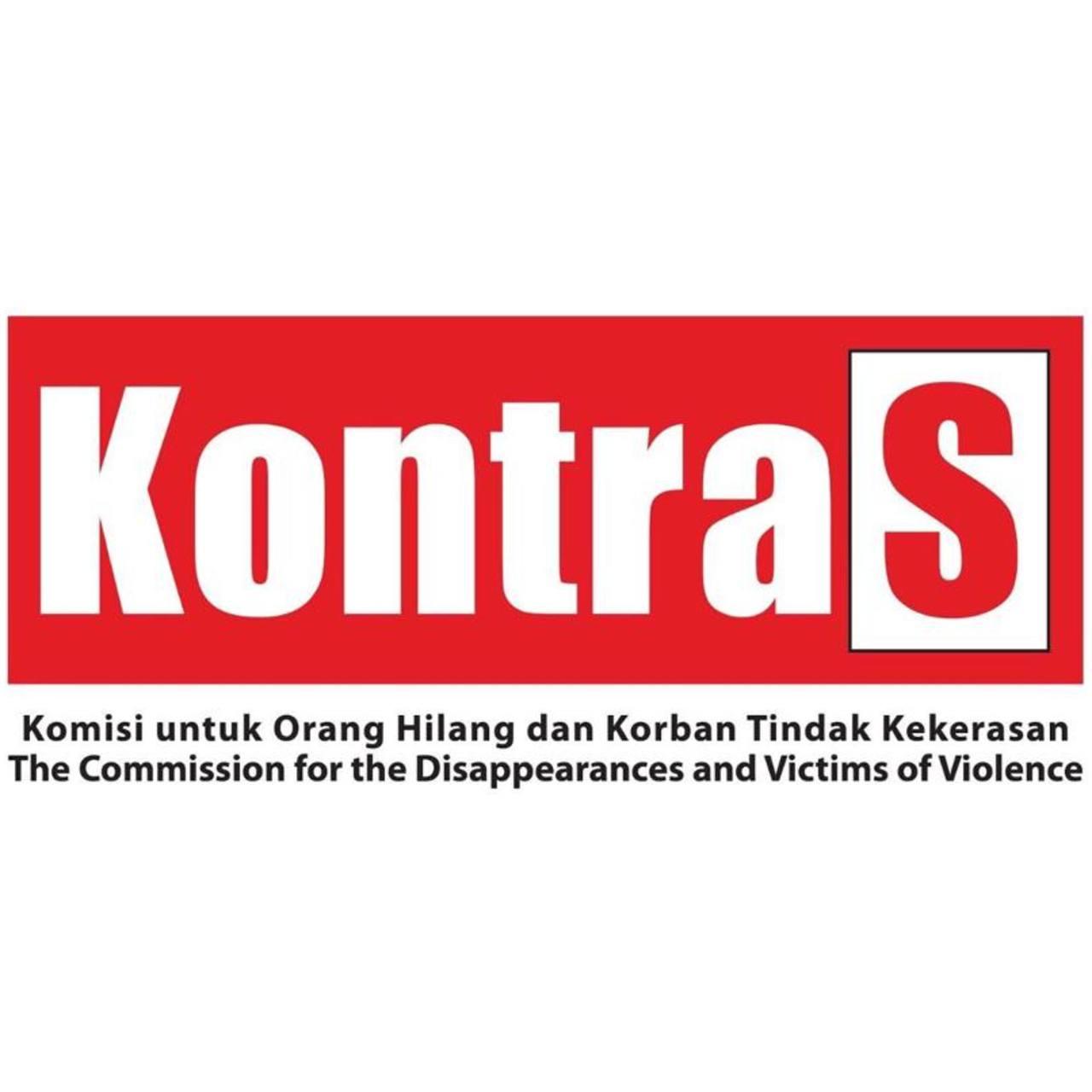
KontraS
Komisi Untuk Orang Hilang dan Korban Tindak Kekerasan

